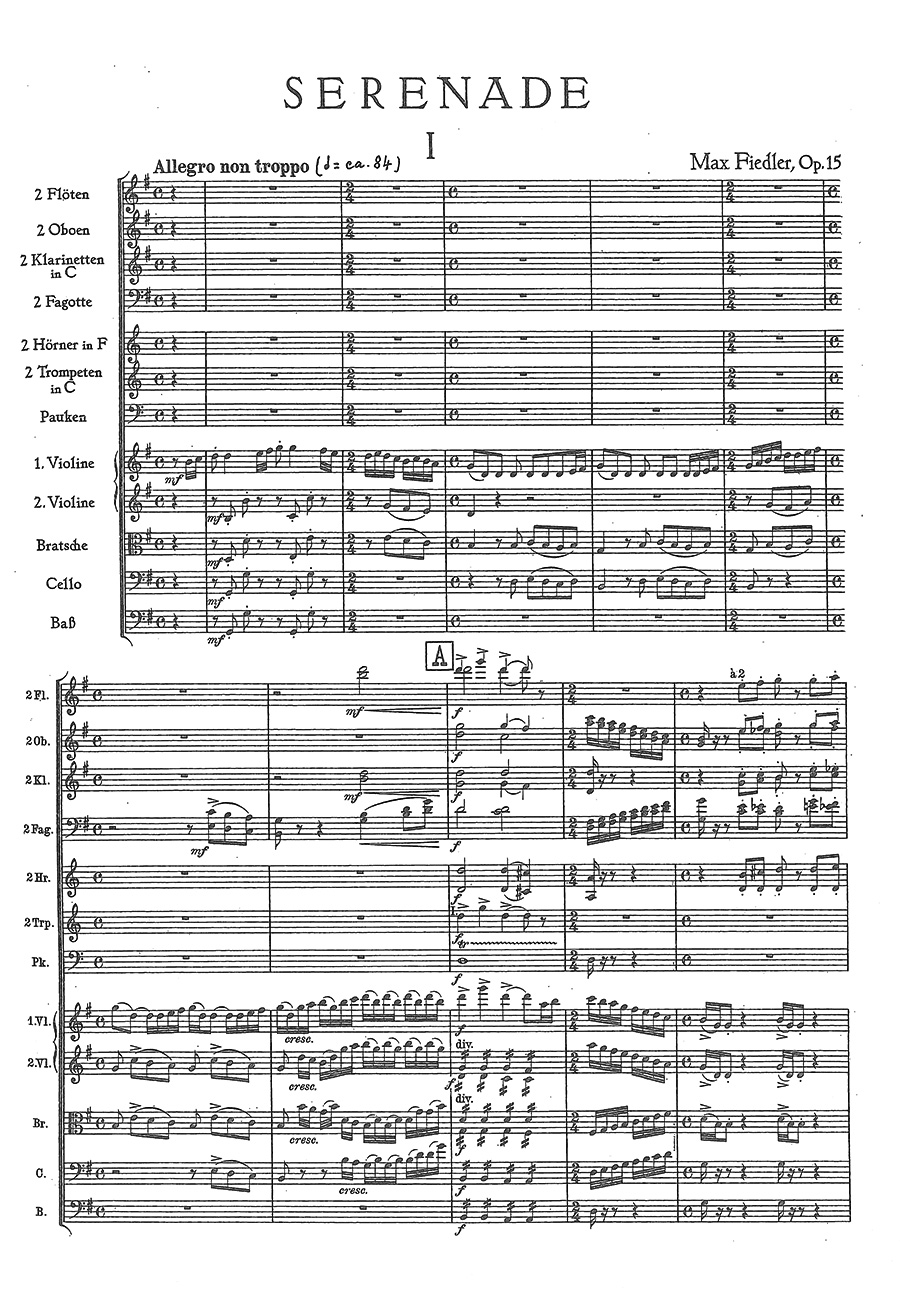Serenade in G Op. 15 for small orchestra
Fiedler, Max
19,00 €
Preface
Max Fiedler – Serenade in G major for small orchestra, op. 15
(b. Zittau, 31 December 1859 – d. Stockholm, 1 December 1939)
(1932?)
I Allegro non troppo (p. 1) – Tranquillo (p. 3) – (Tempo I, p. 5) – Tranquillo (p. 9)
(Tempo I, p. 10) – Tranquillo (p. 13) – (Tempo I, p. 15)
II Allegro giocoso (p. 18) – Meno mosso (p. 21) – Tempo I (p. 23) – Tranquillo (p. 27)
III Allegro agitato – Tranquillo (p. 28) – Walzertempo (p. 29)
Allegro non troppo (Tempo del primo movimento) (p. 42) – (Fine molto tranquillo, p. 46)
Preface
August Max Fiedler was one of the greatest and most celebrated conductors of his generation. He grew up in his native Zittau, where he received his first music lessons from his father Karl Friedrich August Fiedler, a clarinetist, violinist, and pianist from Germany’s Wendish minority. On 23 February 1870, Max gave his first public performance at the age of eleven, playing the solo part in Mozart’s A-major Piano Concerto (K. 488). Before enrolling at Leipzig Conservatory, he played Chopin’s F-minor Concerto in Zittau under his father’s baton on 21 February 1877. The same concert witnessed the première of his orchestral character-piece Abschied. Until 1880 he was a student in Leipzig, where he was instructed in piano by Carl Reinecke (1824-1910), who influenced him particularly in the Schumann tradition, and in composition by the learned contrapuntist Salomon Jadassohn (1831-1902). His musical way of thinking was heavily influenced by Moritz Hauptmann (1792-1868). Having passed his examinations, he played Reinecke’s C-major Piano Concerto in his final concert.
In 1882, Fiedler, at Reinecke’s recommendation, was made a piano teacher at the Von Bernuth Conservatory in Hamburg. There he came into close contact with Brahms’s friend Julius Spengel (1853-1936), who conducted Hamburg’s St. Cecilia Society from 1872 to 1927. In this way he became acquainted with Brahms, who even asked him to deputize for him in the solo part of his Second Piano Concerto. Fiedler frequently heard Brahms play his own music, and later remarked of his rubato that “it cannot be put down in writing.” He also befriended Hans von Bülow, and in later years was celebrated throughout the world as the “authentic interpreter of Brahms.” Fiedler deeply venerated Brahms to the end of his days and was most deeply impressed by von Bülow as a conductor. His successful conducting début came about at a Hamburg Philharmonic Concert on 3 December 1886 at the suggestion of the Philharmonic Society’s musical director, Julius von Bernuth (1830-1902). On this occasion he performed his only Symphony in D minor, composed in 1885-86. It proved to be the turning point in his career, and he soon became the audience’s favorite among Hamburg conductors. In a few years the number of “Fiedler concerts” rose from one to ten per season, eclipsing even those of the Philharmonic. In the course of the 1890s he came to be seen as one of Germany’s front-rank conductors. In 1898 he received his first invitation to St. Petersburg, where every winter he conducted the Imperial Russian Society of Music in four concerts over five weeks in St. Petersburg and one in Moscow (featuring inter alia Nikolai Medtner as soloist). He also become increasingly committed to the music of Richard Strauss and formed friendships with Alexander Glasunov (who spoke fluent German), César Cui, Anton Rubinstein, Rimsky-Korsakov, Liadov, Taneyev, and Arensky. Further invitations for guest performances soon followed from Spain, France, Italy, and England. In 1904, one year after his appointment as co-director of the Von Bernuth Conservatory, the competing enterprises merged under his leadership. The same year saw his début in Philadelphia. Now nothing more stood in the way of an international career. In 1908 he succeeded Wilhelm Gericke, Arthur Nikisch, and Karl Muck as principal conductor of the Boston Symphony Orchestra. Soon the New York press was praising him to the skies: …
Read preface / Vorwort > HERE
Score Data
| Score Number | 1478 |
|---|---|
| Edition | Repertoire Explorer |
| Genre | Orchestra |
| Pages | 56 |
| Size | 210 x 297 mm |
| Printing | Reprint |
